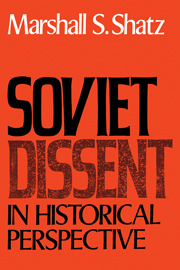Book contents
- Frontmatter
- Contents
- Preface
- 1 Introduction
- 2 The genesis of the Russian intelligentsia
- 3 The formation of a Russian intelligent
- 4 Reason and revolution
- 5 Khrushchev and the de-Stalinization campaign: the development of literary dissent
- 6 The Siniavsky–Daniel trial and its aftermath: legal tactics and organizational efforts
- 7 The Soviet dissidents
- 8 Programs and prospects
- Notes
- Select bibliography
- Index
3 - The formation of a Russian intelligent
Published online by Cambridge University Press: 04 August 2010
- Frontmatter
- Contents
- Preface
- 1 Introduction
- 2 The genesis of the Russian intelligentsia
- 3 The formation of a Russian intelligent
- 4 Reason and revolution
- 5 Khrushchev and the de-Stalinization campaign: the development of literary dissent
- 6 The Siniavsky–Daniel trial and its aftermath: legal tactics and organizational efforts
- 7 The Soviet dissidents
- 8 Programs and prospects
- Notes
- Select bibliography
- Index
Summary
It is only a personal injury that proves mortal; one can get over injuries to other people.
Michael Bakunin, 1870.In the hundred years from the formation of the Decembrist societies to the Russian Revolution of 1917, social theories and political organizations rose and fell within the intelligentsia in rapid succession. The post-Decembrist generation, the “men of the forties,” exemplified by Alexander Herzen, were dominated by German idealist philosophy and the controversy between the Westernizers and the Slavophiles over Russia's relationship to Western culture. It was also this generation that began to study French socialism. The next generation, the “men of the sixties,” with Nicholas Chernyshevsky as their chief mentor, adopted materialism and scientism as their philosophical creed and socialism, based on the Russian peasant commune, as their political program. Also in the 1860s, following the emancipation of the serfs in 1861, the revolutionary movement got under way in earnest. The Populist movement, with its commitment to peasant socialism and its willingness to engage in antigovernment terrorism to achieve it, dominated the 1870s, while Russian Marxism, committed to proletarian socialism, arose in the eighties and nineties. These two socialist currents competed for the intelligentsia's loyalties and were joined at the turn of the century by a revitalized liberal movement, which also sought fundamental changes in the existing order, particularly a parliamentary political system, but preferred legal methods of activity.
- Type
- Chapter
- Information
- Soviet Dissent in Historical Perspective , pp. 39 - 63Publisher: Cambridge University PressPrint publication year: 1981



